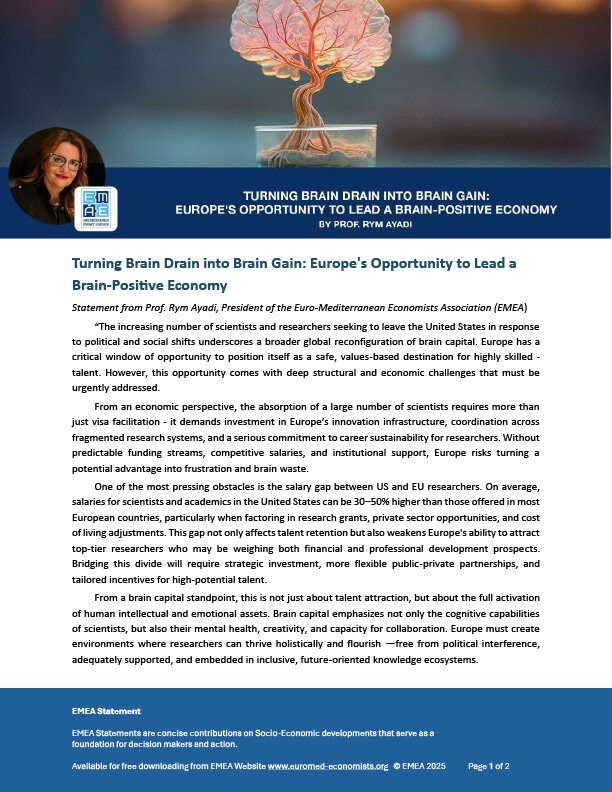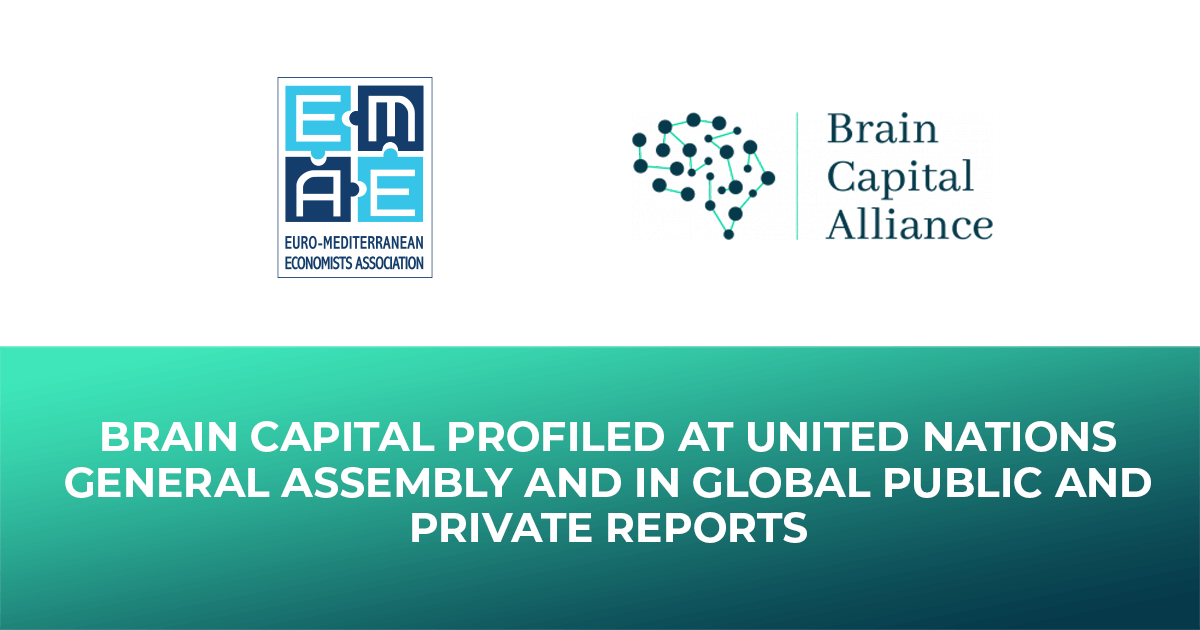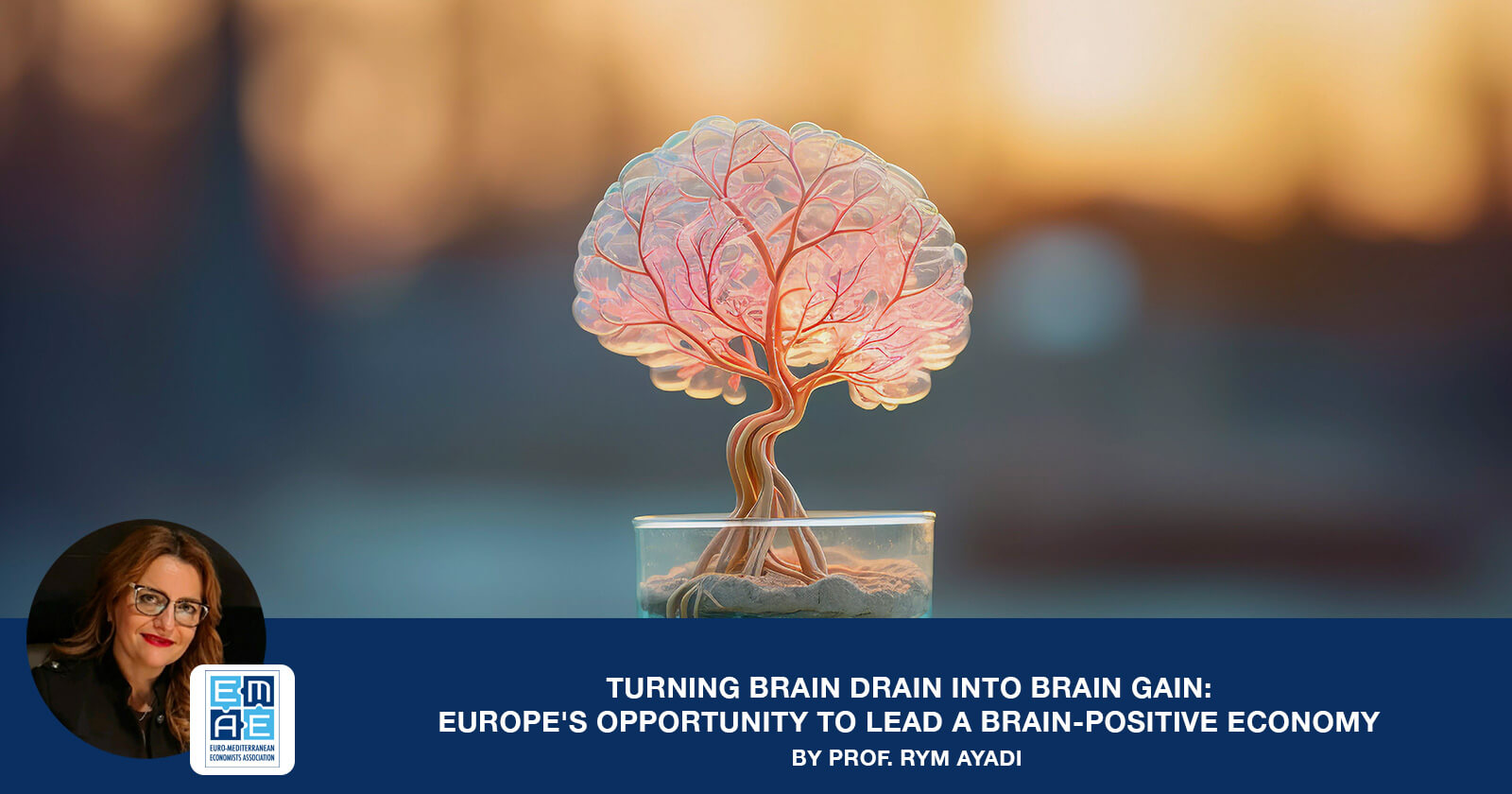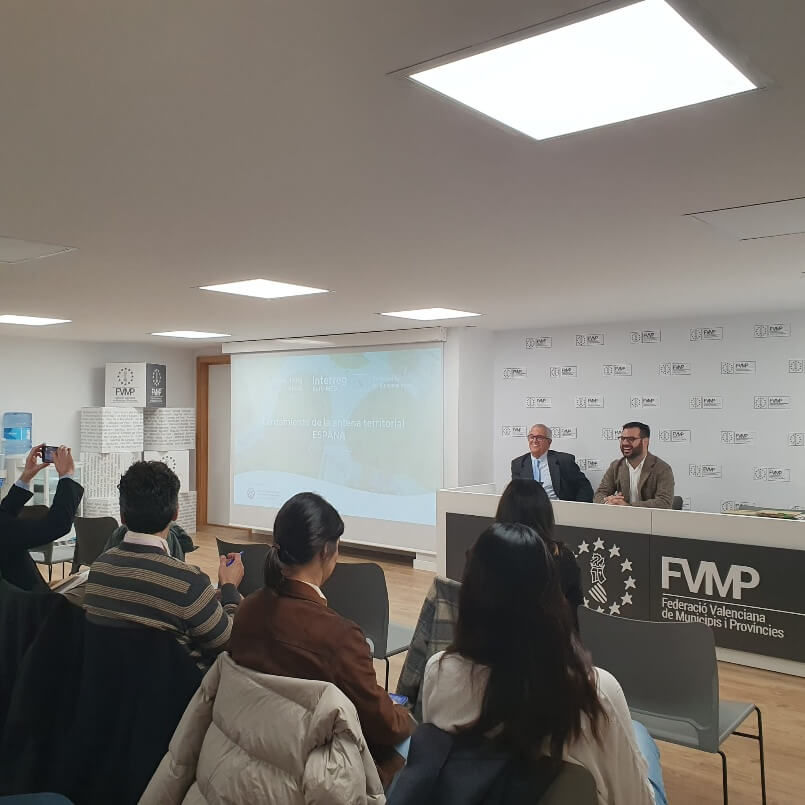Barcelona, 29 September 2022: “In a post-industrial era, the demand on societies for a highly skilled and knowledgeable workforce is rapidly increasing. Optimizing brain health and investing in building cognitive and brain capital (e.g., by addressing brain health determinants including education, health care and healthy environments) is fundamental to meet these modern societal challenges and to drive innovation. This necessitates integrated action across all sectors of society in order to address adequately all of the brain health determinants across the lifespan.” This was a notable framing comment in the recent World Health Organisation brain health position statement.
William Hynes DPhil was a featured speaker at the launch WHO position statement. He has been a key driver of the brain capital work. Hynes is head of the New Approaches to Economics theme at Organisation for Economic Co-Operation and Development, senior advisor to the OECD Secretary General and co-lead of the OECD Neuroscience-inspired Policy Initiative (NIPI). Hynes commented on the evolution of brain capital, “Brain capital is a powerful platform for change. It is a holistic approach to understanding and promoting the role of the brain, brain skills and brain health”.
Lundbeck, a Danish central nervous system-focused pharmaceutical company, also released their brain health position statement recently. They noted “The world is increasingly relying on “brain capital”, where a premium is put on brain skills and brain healthᶦ (e.g. individual’s cognitive, emotional, and social brain resources).”
Harris A. Eyre MD PhD, lead of the Brain Capital Alliance, advisor to the Euro-Mediterranean Economists Association (EMEA) and Senior Fellow for Brain Capital with the Meadows Mental Health Policy Institute noted, “The brain capital framework is based on the assumption that our brains are our greatest asset and provides an approach to define brain issues, quantify them, and track them. Brain Capital can be driven into policies and investments. Our new Brain Capital Alliance is a public-private-people partnership and applauds the work of the WHO and Lundbeck”. Eyre is also co-lead of the OECD NIPI.
The recent United Nations Development Programme Human Development Report noted that multiple crises have halted progress as 9 out of 10 countries fell backwards in human development. They warned “The world is lurching from crisis to crisis, trapped in a cycle of firefighting and unable to tackle the roots of the troubles that confront us. Without a sharp change of course, we may be heading towards even more deprivations and injustices”. The seminal brain capital paper published by Eyre, Hynes et al. in Molecular Psychiatry was cited as an exemplar of novel policy approaches to optimizing human development.
The Brain Capital Alliance and the OECD NIPI were key partners in the “Global Partnerships in Brain Research” event at the Science Summit of the 77th United Nations General Assembly. This meeting highlighted existing major global partnerships and explored new collaborations for alignment, with brain capital as a key framework.
Brain capital also received notable mentions recently in United States Congressional presentations to the Congressional Neuroscience Caucus (by Eric Lenze MD PhD, Incoming Chair of Psychiatry, Washington University at St Louis) and to the US House Select Committee on Economic Disparity and Fairness in Growth (by Carol Graham PhD, Senior Fellow at The Brookings Institution). An event was held on brain capital in July 2022 by the Center for European Policy Studies (CEPS) titled “Towards a Person-Centered Approach to Brain Health”.
Agustin Ibanez PhD, Director of the Latin American Brain Health Institute (BrainLat) at Universidad Adolfo Ibañez noted, “The two greatest levers for change in the field of brain health are public policy and private investment. I am pleased to see the brain capital agenda related to these areas. We have recently launched the first international courses on Brain Health for Latin America, with the hope to create early transdisciplinary insights in the region. We have recently launched the first international courses on Brain Health for Latin America, with the hope to create early transdisciplinary insights in the region. Much more work is needed, but this is a good start”. Ibanez is also an Associate Research Professor at Trinity College Dublin and Senior Atlantic Fellow at the Global Brain Health Institute.
PwC has also published a report citing brain capital titled “Brain expert: growing the Nigerian economy”. The report analyses Nigeria’s best development path and share insights on how it can become a developed nation by exporting brain capital. The report proposed that Nigeria has a significant brain capital advantage with a large youthful population of an average age of 19 years. Considering the ageing population in countries such as Germany, Japan, Italy and the United States, it is estimated that the worldwide working-age population will see a 10% decline by 2060. Japan tops this list with 28% of its population above 65, and Italy comes second with 23%. In contrast, only 2.7% of the Nigerian population is above 65, so Nigeria is strategically positioned to supply labour to the global market, a strong comparative advantage.
After success in the brain health field, brain skills are the next area the Brain Capital Alliance group is moving to advance. Rym Ayadi PhD, Founder and President of EMEA, Senior Advisor to CEPS and co-chair of the Brain Capital Dashboard Working Group noted, “Brain skills are becoming increasingly valuable in our modern, innovation- and knowledge-driven economy. Regions with rich educational investment beget more patents; more patents breed technological advancements, which in turn serve as the foundation for jobs, employment, and a thriving economy. Further, as automation threatens to displace millions of jobs, the workers of the 21st century will need to adapt and develop new cognitive skills in order to preserve jobs and income. In the middle of global crises like the COVID-19 pandemic and accelerating climate change, people will also need to rely on proficient brain skills in order to stay emotionally resilient.”
Ayadi noted the Alliance team is working on upcoming events, publications, and data analysis in this field. “We are only going to accelerate our momentum”. On the topic of creativity as a key brain skill, Ayadi and Eyre are collaborating with Theodore Edmonds for the First Annual Imaginator Summit in Denver, Colorado, October 13 and 14. Theo Edmonds is the Directing Co-founder of Imaginator Academy, and Research Associate Professor, College of Liberal Arts & Sciences, University of Colorado Denver.
Ayadi’s EMEA is also hosting a major event at the Mediterranean Pavilion of the upcoming United Nations Climate Change Conference (COP 27) which will showcase brain capital as part of an “innovative integrated transformative action agenda to tackle climate change”. The objective of this event is to discuss the transformative action towards accelerated sustainability from a trans-disciplinary perspective, linking economy with technology-based clean energy, biodiversity, neuroscience, urban planning and finance.
Links to noted documents and presentations are below:
- WHO position statement: https://www.who.int/publications/i/item/9789240054561
- Lundbeck position statement: https://www.lundbeck.com/global/about-us/our-commitment/our-position-on-brain-health
- UNDP Human Development Report 2022: https://www.undp.org/press-releases/multiple-crises-halt-progress-9-out-10-countries-fall-backwards-human-development-undp-report-warns
- UNGA event: https://www.braincouncil.eu/event/global-partnerships-in-brain-research-event-at-science-summit-unga77/
- Seminal brain capital paper in Molecular Psychiatry: https://www.nature.com/articles/s41380-020-00918-w
- Presentation to the Congressional Neuroscience Cause: https://www.youtube.com/watch?v=sdUwKIHccFE
- Presentation to the US House Select Committee on Economic Disparity and Fairness in Growth can be access via this link: https://www.brookings.edu/wp-content/uploads/2021/10/Carol-Graham-Testimony-Sept-28-2021.pdf
- CEPS event: https://www.ceps.eu/ceps-events/launch-event-of-the-brain-capital-alliance-towards-person-centred-approach-to-brain-health/
- Media article of BrainLat brain capital course: https://www.eldestapeweb.com/sociedad/salud/politicas-publicas-y-neurociencia-la-deuda-con-la-salud-cerebral-2022910526?utm_medium=Social&utm_source=Twitter#Echobox=1662030318
- PwC Report: https://www.pwc.com/ng/en/publications/brain-exports-growing-the-nigerian-economy.html
- First Annual Imaginator Summit: https://www.imaginatoracademy.com/





